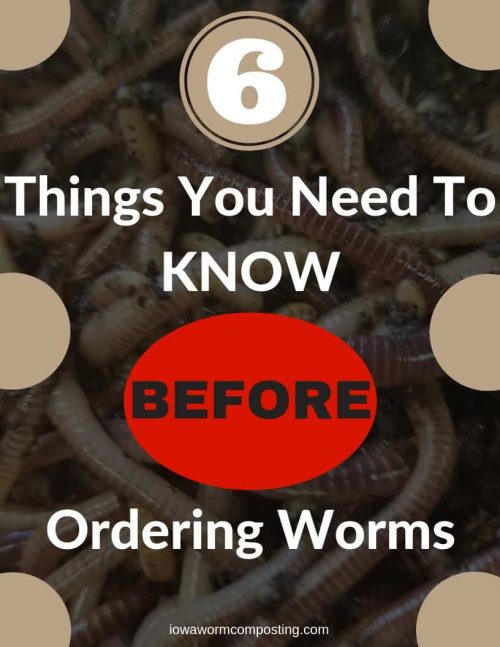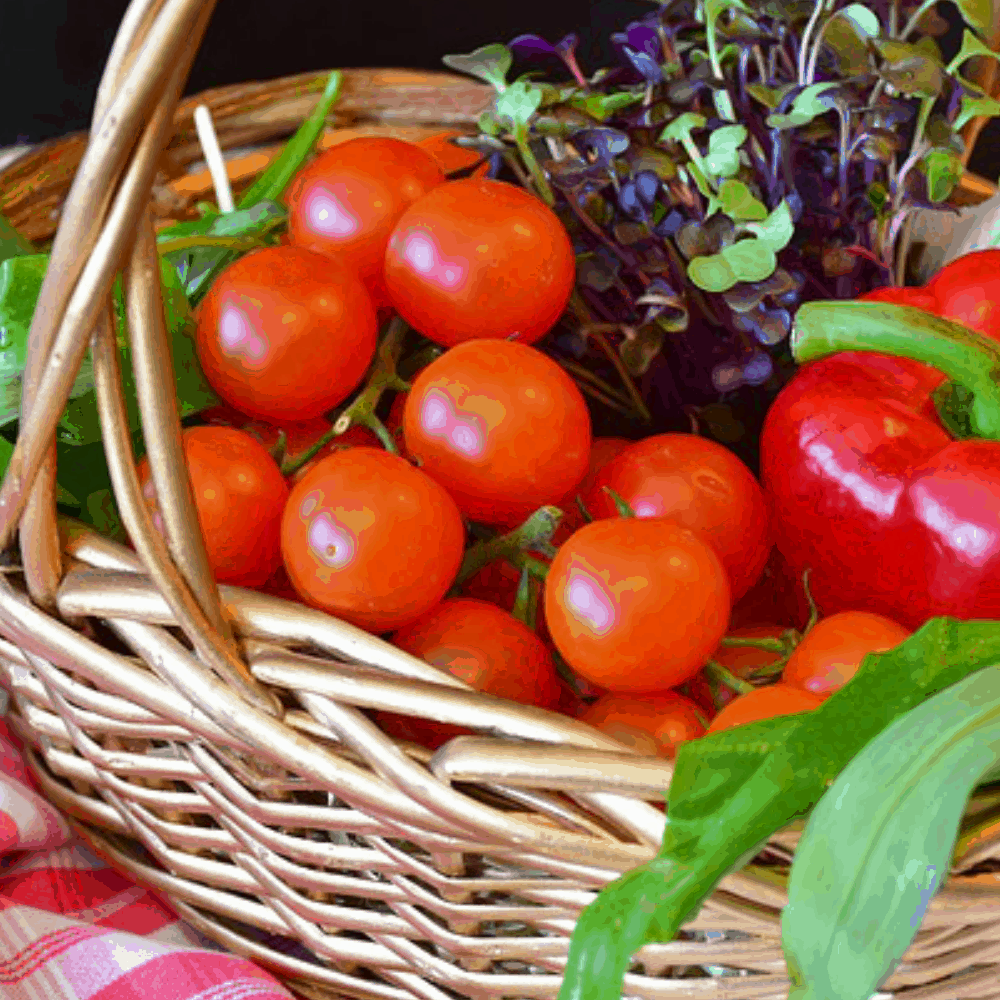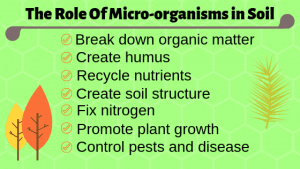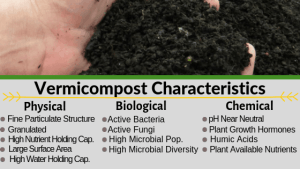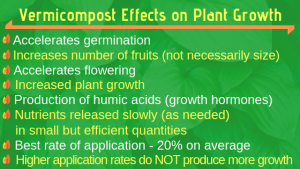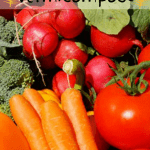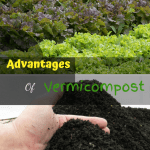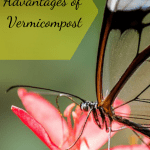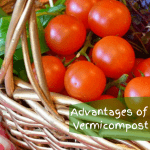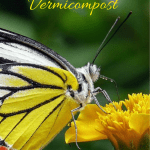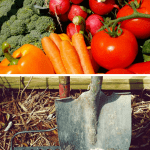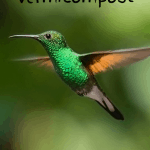Advantages of vermicompost are many. We hear all the time about how vermicompost or worm castings are so good for our organic gardens.
But “Why”? What makes vermicompost so beneficial? Exactly how does worm castings or vermicompost make our gardens and landscapes better? How come they are better for our plants than synthetic fertilizers? What are the characteristics that make them work so well?
Settle in because we are going to answer these questions and more in this article.
A Brief Overview of Vermicomposting
No amount of discussion about the advantages of vermicompost would be complete without addressing how to make vermicompost.
Vermicompost or worm castings are organic material that has passed through a worm’s digestive tract. Let’s not dress it up. It is worm poop! But, the amazing thing is that it does not smell bad. It smells like freshly turned earth.
There are many ways to produce vermicompost. They range from something as simple as a home worm bin to vermicomposting projects that process hundreds of tons of waste daily. And, everything in between. There are vermicomposting businesses that are designed to produce worm castings as their primary commodity quickly and efficiently.
The United States is certainly behind other countries for large vermicomposting projects but worm composting is starting to become more popular here. Hopefully, we will start to realize the enormous benefits of vermicomposting and make the necessary investments. Big Agricultural companies make this more difficult because they protect their markets with fervor.
Micro-organisms In Soil
We need to talk about healthy soil because this is important to understanding how vermicompost benefits plants.
Specifically, a discussion of the role micro-organisms has in the larger soil food web. Micro-organisms play a critical role in the formation of healthy soils.
There is no better source of information on the Soil Food Web than the teachings of Dr. Elaine Ingham. Dr. Ingham has been teaching soil science for decades. She is the pre-eminent authority on the subject. If you would like more information about her work please click the link above.
Here is an interesting fact: One teaspoon of healthy soil contains between 100 million and 1 billion micro-organisms.
The soil is alive and is a complex composition of minerals and micro-organisms. This graphic explains the role of micro-organisms in healthy soil. This also begins to explain the advantages of vermicompost.
Vermicompost and Worm Castings
Vermicompost and worm castings are the same thing. We know that it is worm poop. Food waste passes through the worm’s digestive tract. It is transformed into stabilized organic matter by the bacteria in a worm’s gut. So, what characteristics does vermicompost have that makes it so beneficial to plants?
The physical characteristics are a high nutrient holding capacity, fine particulate structure, granulated, high surface area, and high water-holding capacity. In layman’s terms, this means that individual worm casts hold water, nutrients, and help make airspace in your soil (less compaction).
The biological characteristics are active bacteria, active fungi, high microbial populations, and high microbial diversity.
The chemical characteristics are a pH near neutral, contains plant available nutrients, has plant growth hormones and contains humic acids.
Vermiculture Research
The preceding vermicompost information came from a presentation that Dr. Norman Aroncon gave at the 2018 Vermiculture Conference.
Dr. Aroncon was a student and researcher for Dr. Clive Edwards at The Ohio State University. Dr. Clive Edwards was considered one of the world’s foremost researchers in Vermiculture. Norman Aroncon continues the research now at the University of Hawaii-Hilo.
Dr. Aroncon conducts plant growth research with worm castings and worm compost tea. He is also involved in aquaponics research primarily with worm castings tea.
Advantages of Vermicompost for Plant Growth
All of the scientific jargon above is great but what about my plants? Fair question. We want to know how vermicompost can help our plants because that is where the rubber meets the road, so to speak.
We discussed previously the importance of micro-organisms for healthy soil. For instance, active bacteria, fungi, plant growth hormones, and other living organisms. Vermicompost contains this biology while synthetic fertilizers do not.
There will be more on synthetic fertilizers later on in this article. For now, let’s focus on the advantages of vermicompost for plant growth. This graphic shows how plant growth is affected by vermicompost.
Advantages of Vermicompost on Plant Growth
Let’s address these benefits individually because it is important for you and your organic garden.
- Accelerates Germination – Your seeds sprout more quickly and the sprouts are healthier.
- Increases Number of Fruits – This means more production from your garden. Your fruit size will not necessarily be larger but there will be more of them Higher Yields!
- Accelerates Flowering – Your fruits and vegetables flower earlier and you will be able to harvest earlier,
- Production of Humic Acids – The living biology in vermicompost helps to create humic acids and plant growth hormones. This promotes healthier plants and more nutrient-dense produce. It is also a major contributor to disease resistance and pest deterrence.
- Nutrients Released Slowly as Needed – This means that your plants can uptake nutrients over the season and the vermicompost will release these nutrients as needed. You will not need to continually add vermicompost through the growing season.
Vermicompost Application Rates
- Best Rate of Application – 20% by volume vermicompost to the soil is an average best rate. This would apply to the preparation of soil mixes. 1 part vermicompost to 4 parts soil mix. We find when transplanting our vegetables that a good rule of thumb is to use a half cup in the bottom of the transplanting hole for small plants. For our larger plants (ie. tomatoes and peppers), we use 1 cup in the bottom of the hole. Place your plant, cover with dirt, and water well. No transplant shock either with vermicompost.
- Higher Application Rates Do NOT Produce More Growth – More is NOT better! All the so-called Gurus that tell you that using more vermicompost won’t harm your plants are “Dead Wrong”. Plant growth rates when using vermicompost exhibit a Bell-shaped curve. Growth rates increase with larger amounts of worm castings, level off, and then start to decline. This baffled researchers for years until the testing methods became better. This has finally been attributed to excess plant growth hormones. Many herbicides are made with large amounts of plant growth hormones. The plants/weeds grow too fast and because of this accelerated growth, succumb and die. The takeaway here is to use about 20% vermicompost for best results.
Vermicompost vs. Chemical Fertilizers
We have been expounding the advantages of vermicompost for a thousand words or so. If it is so good; why isn’t everyone using it? There are a few reasons but cost and education are the main culprits.
Big Agriculture and even the gardening industry have big war chests and advertise to their markets relentlessly. They are interested in selling their own products even if it isn’t in your best interest.
Many people do not know about organic fertilizers and how a healthy soil food web is so important. They get their gardening information from TV commercials and magazines. They are also cost-conscious.
Chemical fertilizers are much cheaper than vermicompost or other organic, soil building fertilizers. In the absence of good information, people will generally opt for the least-expensive solution.
However, the cheapest short term solutions often have the highest costs later on. This is the situation with synthetic chemical fertilizers.
Facts About Chemical Fertilizers
I just read an interesting article by Dr. Joseph Mercola about our soil food web and synthetic fertilizers. He makes several good arguments and points out a few startling facts. Here are a few of them:
- Plants’ natural symbiotic relationship with soil microorganisms is disrupted by the use of synthetic fertilizer.
- The use of synthetic fertilizers results in higher yields and bigger produce that is less nutrient-dense.
- The mineral content of fruits and vegetables has declined by 5 percent to 40 percent over the last five to seven decades.
- Dr. Mercola is talking about a plant’s health being tied to a reciprocal two-way arrangement with the soil. This is being disrupted by synthetic fertilizers. These events translate into less food for the root microbiome … A plant’s roots go from being a vital, two-way trade zone to one-way straws sucking up fertilizers. (How apt!)
- Fertilizers are destroying fisheries and contaminating drinking water. (I will also add that it is destroying our soil and depleting the minerals).
Dr. Joseph Mercola
Dr. Joseph Mercola is a licensed physician and surgeon from Illinois. He runs the largest nutritional supplement website in the world.
Dr. Mercola has written several books on health and nutrition and is a leading holistic medical authority. He has also written numerous medical publications on a variety of health-related subjects. He is also a NY Times best-selling author.
Dr. Mercola is a somewhat controversial figure because he has taken on the established medical community with his holistic approach to medicine.
However, no one doubts his expertise in health and nutrition. He is an authority.
The article is a really good read and worth your time. I agree with everything he said because it is so true. I linked to it above so take a few minutes and read it. It is a real eye-opener.
Advantages of Vermicompost Conclusion
We covered a lot of ground. Vermicomposting was discussed and some of the ways that it is produced.
We took a scientific journey into the mysteries of the Soil Food Web. However, the surface was barely scratched on that one. There is so much to learn about our soil. Tomes of books have been written on that subject alone.
The characteristics of vermicompost are covered and the reason it so beneficial to our plants and soil.
Vermicompost effects on plant growth are amazing. We presented the research and talked about the benefits to you for your organic gardens.
The optimum application rate for vermicompost is about 20%. More is NOT better!
Finally, vermicompost and chemical fertilizers were compared. We talked about some of the problems with chemical fertilizers. We also talked about the reasons some people are slow to change their point of view.
Hopefully, we have answered most of your questions about the advantages of vermicompost. Do you have a success story to share about the advantages of vermicompost? Do you have more questions that we can address? If so, comment below and share it with all of us. Be sure to post your questions because we will answer them.
Book Referral
I will end this with a book referral. This book is for people that are interested in organic gardening and growing nutrient-dense vegetables. This is a book that you want in your library because you will refer to it often.
The name of the book is: The Intelligent Gardener: Growing Nutrient-Dense Food by Steve Solomon and Erica Reinheimer
Steve Solomon’s story is really entertaining and a little scary at times. There is some very good information presented about organic fertilizers and testing the minerals in your soil. Overall, this is a very good resource.

